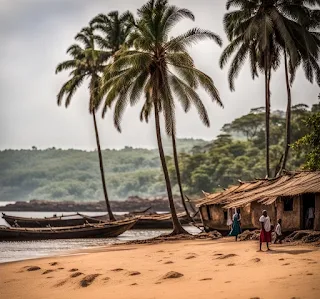1787 The First Settlers Landed in Sierra Leone
The initial arrival of settlers in Sierra Leone marked the beginning of a remarkable chapter in the history of this West African county. In 1787, Sierra Leone's settlers founded Freetown. In 1790, they formed the St. George's Bay Association, and in 1808, Sierra Leone became a Crown Colony.
 |
| Sierra Leone working in the fields |
The Early History of Sierra Leone
In 1787, the very first group of settlers arrived in Sierra Leone. They settled on the land that would later become the city of Freetown. By 1790, the organizers of this settlement came together to create the St. George's Bay Association.
They sought a formal charter and expressed their intentions. Their objectives were establishing a colony on a small part of the African coastline, introducing civilization to the local inhabitants, and cultivating the land through free labor.
Crucially, they firmly renounced any involvement in the abhorrent slave trade, committing not to deal in slaves or allow any such trade in the territory.
The association also pledged to maintain peace unless provoked, punish crimes, administer justice equally based on English law, establish schools for teaching reading, writing, and accounting, and welcome and educate the children of the native population if they chose to attend these schools.
In the subsequent year, the St. George's Bay Association was officially incorporated as the Sierra Leone Company, and it continued to oversee what had now evolved into the Colony of Sierra Leone. This arrangement persisted until 1808 when the British Crown assumed control of its rights and possessions.
The period of governance by the Sierra Leone Company marked a transition in the history of Sierra Leone.
It bridged the gap between when Sierra Leone was seen primarily as a source of wealth to be exploited and when the region's resources were meticulously developed to establish it as a self-sustaining Crown Colony.
 |
| First Settlers Landed in Sierra Leone |
The Company's principal focus was on the welfare of the free settlers, and any commerce it engaged in primarily aimed to support these settlers in pursuits that would enable them to earn a livelihood.
Understandably, the Company was not profitable as it was fundamentally a philanthropic venture, bound by its mission and constitution against involvement in the highly profitable slave trade that dominated the West African coast.
Communication with the country's interior was limited at this time, and the region's natural resources remained largely untapped. Consequently, the Company found that its financial resources were gradually depleting. As a result, in 1800, the Company appealed to the British Parliament for financial assistance, which was granted and later increased.
However, both the Company and Parliament eventually recognized that it was more suitable for the Crown to take over the administration of the Colony. The Company had achieved its mission by establishing the settlement and setting it in motion.
Therefore, it became unreasonable to anticipate that it would continue to invest the significant annual funds required for its maintenance. In 1807, the transfer of authority was approved, and on January 1, 1808, Sierra Leone officially became a Crown Colony under direct British government control.


